The first time I heard about the World Economic Forum was probably 15 years ago. During my university years, my gang of geeky friends included a guy who’s father was a minister in the Jordanian government. A bunch of college friends and I were were in his father’s private office one day (we were probably discussing one of our early plans to create a computer magazine in Jordan), when our friend showed us a publication by the WEF and telling us about this ‘meeting my dad attended in a remote village in Switzerland’, where the world’s business and government elite meet to discuss stuff.
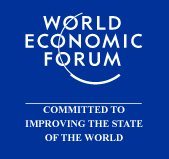
I remember dismissing what my friend showed us as a pretty uncool, businessy, elitist, maybe even sinister type of thing.
Later on, I came to learn more about the hype surrounding the WEF and how the anti-globalization movement staged demonstrations against it (and against the WTO meetings), especially in the late 90’s, at the height of the protests against globalization and the ‘No Logo’ movement.
And so the years went by, until I found myself on the invitation list of the WEF at Sharm el Sheikh last week, to talk about blogging and the internet on a panel about youth and media.
The WEF still draws criticism these days. It is, after all, a high profile meeting of powerful people in business and government. And despite the WEF’s effort to communicate and prove its stated commitment to ‘improving the state of the world’ it is still seen by many, especially from those on the left side of the political spectrum, as an event that allows the ‘greedy capitalists’ to convene with those who hold political power to further exploit the human race and the planet.
My postings about the WEF on this blog drew some interesting comments, mostly critical ones. One particular anonymous commenter was so anxious about his/her comment, thinking that I deleted it because I was a ‘propaganda man’ who is seeking a ministerial position!! Just in case anyone wants to know the truth about that: YES, I am aspiring to become the Minister of Blogging in the next Jordanian Government.. (What? That position is already taken by Jordan Planet’s Isam Bayazidi? Damn! ![]()
Anyway.
The WEF in Sharm el Sheikh was a very interesting experience. It is not everyday that you get to share finger food from the plate of a Japanese man at a party, who you later discover is a senior adviser to the Mitsubishi Corporation, and who, subsequently, gives you a very interesting 15 minute lecture about how Mitsubishi actually plans for, get this, the next 100 years to make sure it stays around and serves Japanese national interests.
A friend of mine, who’s a regular WEFfer termed our stay in Sharm a ‘happy prison’. Happy, because we were in a resort town, with nice weather and good food. A prison, because of the strict security measures taken by the authorities. With so many high powered people from business and politics around, you bet the security will be strict. Entering the conference indeed felt like stepping into the ‘halls of privilege’ as another friend termed the conference.
I am not a high powered journalist. As a owner of a business you can call me a capitalist (wether I’m of the ‘greedy’ variety or not is a judgement I’d rather leave to others ![]() . But for sure I am no match to the billion dollar CEOs at the WEF. So I can’t claim that I attended any back-room lobbying meetings or was privy to any grand, secret deals. Sure, I met a few capitalists (they are kind of hard to avoid at the WEF, you know). But let me tell you who else I met:
. But for sure I am no match to the billion dollar CEOs at the WEF. So I can’t claim that I attended any back-room lobbying meetings or was privy to any grand, secret deals. Sure, I met a few capitalists (they are kind of hard to avoid at the WEF, you know). But let me tell you who else I met:
I met an American guy, who was deeply driven by the events of September 11th to devote his working life to create platforms for dialogue and better understanding between America and the muslim world.
I met a young Palestinian, who, with a bunch of even younger Palestinians publishes a newspaper (for youth by youth).
I briefly met the filmmaker Jehane Nujaim who created Control Room, the highly acclaimed documentary about Al-Jazeera.
I met a Pakistani artist who lives in New York and we spoke about the muslim identity in today’s world.
I met a UN official who was keen to know how the UN can use blogging to be part of the online conversation in the Middle East.
I met people from educational and cultural NGOs who were doing all kinds of interesting things.
In my panel, I got to tell the small audience that attended about the promise of blogging as a conduit for free expression by Arab youth.
And I finally got to see a Amr Diab concert!
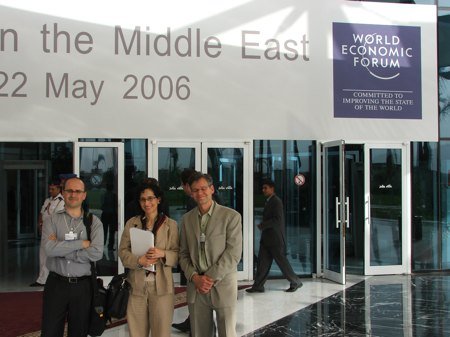
That was MY experience. Did I feel entirely comfortable at the conference? No. I hardly feel comfortable at Amman’s somewhat stuffy business oriented conferences, let alone one with a ‘thousand global leaders’.
So why did I attend?
What I know is that we live in a very complex and interconnected world. Governments, NGOs and, yes, Capitalists are all active players in this global reality. Just because you simply flip a switch on the wall and the light bulb in your room turns on, doesn’t mean the world is simple. Just think of all the ‘capitalists’ and ‘government people’ who make possible something like the internet, which both the globalizers and their enemies happily use everyday.
Some might choose to boycott the ‘halls of privilege’ of the WEF and instead join its ideological antidote, the World Social Forum, which claims that ‘Another World is Possible’. Indeed, I believe need forums like the WSF to constantly remind us that in pursuit of a global economy we cannot throw humanity and the planet to the dogs and that globalization should mean more than the globalization of business.
But I have learned to develop what I consider healthy skepticism towards both global companies and capital (with their rather shameful history of sweatshops and pollution), but also toward the so-called anti-globalization movement too, which often comes across as an incoherent coalition, that, along with truly progressive and future-oriented movements, includes those who still raise the pictures of Lenin and those ‘Leftist’ (but also ‘Nationalist’) functionaries who simply do not want Indians, Chinese or Jordanian taking the manufacturing or IT jobs of Europe and the US. That’s not to mention those (in Germany for example) who oppose any reform or change and are willing to demonstrate for their ‘Right to Laziness’.
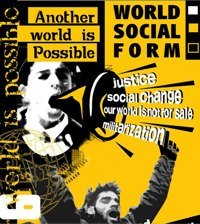
With that in mind, I attended the WEF. In business and in life, I am willing to engage anyone who’s willing to listen to what I have to say (my personal slogan these days is ‘Design Will Save the World’ courtesy of Art Lebedev Studio ![]() . Moreover, as a business owner, I am definitely interested in meeting potential corporate on institutional clients.
. Moreover, as a business owner, I am definitely interested in meeting potential corporate on institutional clients.

Markets and capital cannot be simply wished away to be replaced by some socialist utopia. After interacting with the worlds of business and NGOs, I believe that business has something to teach even the most well-meaning non-profit organization (efficiency and measurability of results, for example). Business has a big role to play in the Arab region to push our societies forward. In that respect, not only our governments need reform, but also our companies. Arab business needs to re-invent itself around the concepts of sustainable innovation, differentiated branding and efficiency.
So beyond the tired, crude, ‘capitalists vs. socialist’ dichotomy I am more interested in people, organizations and companies who understand markets, the environment, society, technology and capital and who are are positively engaging our networked and multidimensional global reality to forge new, human-centered solutions.
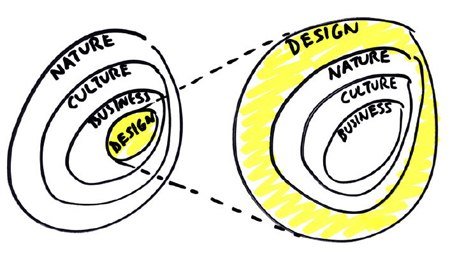
The Bruce Mau napkin sketch that started the Massive Change project
Two recent examples of that would be the what Canadian designer Bruce Mau is doing with his ‘Massive Change’ project and what Nicholas Negroponte is doing with the One Laptop Per Child program (have a look at their People page to see what the Jordanian technologist Khaled Hassounah is doing there, for example).
I leave you with some images to ponder..
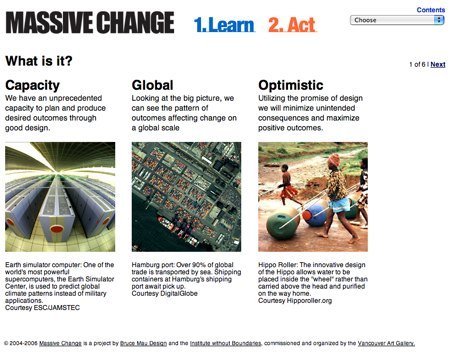

Comments
8 responses to “My three days with the ‘greedy capitalists’”
very well-said Ahmed as usual of course! and an interesting way of looking at it.. there’s always a huge grey area I suppose, which we tend to miss most of the time in our polarized state. I have yet to find my peace.
as usual of course! and an interesting way of looking at it.. there’s always a huge grey area I suppose, which we tend to miss most of the time in our polarized state. I have yet to find my peace.
Thanks for the different perspective. As much as I oppose such “imperialistic” events, it was very nice to view them from an “insider” alternative point of view.
Thanks lina,
It’s not just a matter of a ‘grey area’, or ‘balance’. It is also a matter of fusion and creative combination. And it is a matter of critical thinking without entrenched notions.
One thing is ure. The Arab world need Massive Change when it comes to economic developmnet, or else we’ll have huge unemplyment and instability. And the region needs to think beyond oil. The private sector needs to move. Cross country and global cooperation is not something that this region can afford to ignore.
One other interesting notion that has become clearer to me recently is that while the the Arab world has failed to be united, business and media are creating their own sort of Arab unity. Think of all the Jordanian working in the Gulf, and think of the Gulfian investment in Jordan and elsewhere. It is definately a new and interesting state of affairs.
I really enjoyed reading that. It sounds like a great experience and that you went with an open mind. I agree with you about having reservations about globalization issues, but that we shouldn’t be blinded by one side or another tries to convince us because like Lina said, it’s not just a black and white issue.
Just out of curiosity, the American guy you mentioned, was his name Ronald Bruder (he started an org called Education for Employment Foundation)?
That was a fascinating and honest overview of your experience at the WEF. Although i consider myself to be a “new socialist” supporting the World Social Forum I stil think the WEF is very powerful since it is the location where the real decision-makers of the world meet. Each year I download all the summaries of the sessions to read them carefully and get a clear idea about how the drivers of change think. It is great to hear that you have used Jordan Planet as an example and it shows the gradual but strong impact of the blogging system.
Batir: thanks for your assesment. I agree with you about the ‘real decision makers’ point. I have often found myself being able to influence decision makers (at different levels) to adopt design and strategy options that were more innovative and more appropiate. I often find decision maker ill informed (rather than simply ‘bad’).
This attitude means that I work mostly ‘within’ the system. There is always the danger of getting totally sucked in by the system, of course. So a dose of getting exposed to differing views is healthy.
Jordan Planet is great example to cite by the way. It’s none corporate nature is also admirable.
—
Moi,
the guy is not mr bruder..
And thanks for the comment too
Humaid: This attitude means that I work mostly ‘within’ the system.
The slippery slope of rationalizations has no end. Many before you have braved the SYSTEM and left with full pockets but did nothing for Jordan, except a legacy of more self-serving rationalizations and meansigless slogans to cover their tracks.
“suppose a landlord decided to be kind to a poor tenant and collect no rent. The landlord would be unable to pay the mortgage and the bank would take over. Suppose the director of the bank that owned the mortgage decided to be kind to the kind landlord and not replace him. In that case, profits would fall and the bank director would be replaced. Suppose by the furthest stretch of the imagination that the stock holders in the banking firm decided to be kind and not fire the bank director. Then the bank would eventually go bankrupt and a new bank would take over the mortgage and fire all the kind people.”
The problem, it would appear, is not that the people in power are greedy and heartless, though some obviously are, but that the rules by which they play—and by which we are all forced to play—reward venality and penalize kindness.
Socialism, from what I read, or from what I understand about what I read is, socialism isn’t about removing Markets or Capital, or “wishing it away” it would stay in place. Socialism doesn’t wanna stop business, it wants to stop the hording of money by a select few, I understand socialism to be about removing the excessive profits from companies and their owners greedy hands and use it build better schools, better technology, greener homes, build rivers to areas prone to drought, use the dirt removed from the new rivers to build up places prone to flooding, better fuel products (as it would take some cash to switch every gas station over to a new cleaner, renewable fuel) and those are some quick ideas or SUGGESTIONS I don’t like forcing things on people. But hey are those not good suggestions? I think as humans are purpose on earth is to be the maitenance sepieces, we are the only species to be able to change the climit, build lakes (an exception is the Canadian Beaver), build islands, manage populations of countless other speies but not our own, we are the organisers of chaos, and right now capitalism or is there something I missed that is making us look like parasites.
You made me see I need to learn more a capitalism, thank you. If you think socialism wants a utopia society, is that worse or better than the conditions now? And who is to say that these utopia conditions couldn’t come from capitalism, I’ll tell you who, the Capitalist.
All I see is people on both sides of the issue acting like we want different things, when we all want the same thing (a more sustainable way of life). And a few people getting rich off of our foolishness. And I think socialism is a way to bring both sides together, where as capitalism, even if the majority of capitalists wanted to change the nature of business from profiting the owner, to profiting the community, the country, and the planet as well as the continuation of the company, the richest of the rich wouldn’t allow it, but this only what I’ve understood from what I read, and I admit I need to read more….
Let me see if I can show you how similar your words are to the ideas of socialism. These are your words. I just changed 3 words
“[Socialism] has a big role to play in the global region to push our societies forward. In that respect, not only do our governments need [socialism], but also our companies. [ALL] business needs to re-invent itself around the concepts of sustainable innovation, differentiated branding and efficiency.”